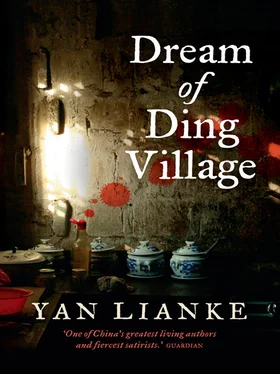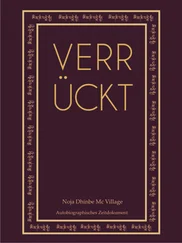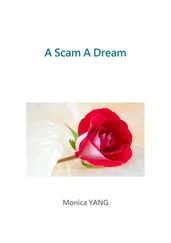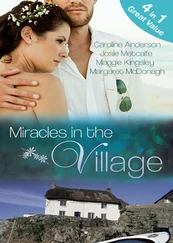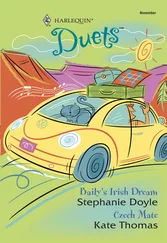5
At sunrise, my dad arrived in Ding Village with a big group of people and a gilded coffin. The coffin, made of five-inch-thick planks of gingko, was engraved with scenes of Beijing, Shanghai, Guangzhou and other rich, modern Chinese cities. There were scenes of foreign cities, too, places that no one would have recognized if they hadn’t been labelled as Paris, New York or London. I didn’t know where New York or Paris were, and I didn’t care. All I knew what that my home was Ding Village, and that Ding Village was on the East Henan plain. I didn’t care how fancy my casket was, or if the gold paint on it was real, or if it was worth as much as all the land in the village.
The sunlight glinting off my coffin was blinding. It was like the sun had fallen from the sky and turned into an oblong square. My dad and the others paraded my coffin through the village, attracting a lot of attention. Everyone who was still alive came out to see it, to gape at the golden casket with carvings of places they’d never seen before, and never would. Right there, on my coffin, was the modernity and excitement of China’s big cities, and the wealth and grandeur of all the cities in the world.
They set the coffin beside my grave, burned incense, made paper offerings and set off firecrackers. Then they dug up my grave, transferred my bones from the plain wood coffin to the golden one, and carried it away with great ceremony.
When they lifted that golden coffin, I started thrashing around inside it, screaming for my grandpa. Not screaming for my father. Screaming for dear life.
‘Grandpa! Don’t let them take me!’
My cries shook the heavens.
‘I don’t want to leave here! Don’t let them take me!’
My screams ripped a hole in the sky.
‘Save me, Grandpa, save me . .
’ My voice filled the schoolyard and echoed through the village and across the plain. My cries rose to the heavens, and fell like raindrops on to the parched and blighted earth.
6
The day I got married, there was a slight breeze, the weather almost cool. My mother and sister set out early to fetch my bride, or in this case, her remains. Her bones. My dad came to Ding Village to dig up my remains and take them to Kaifeng, to be buried with Lingzi. What was left of me would be travelling to my bride’s hometown, not the other way round.
The sun hung low in the sky, a brilliant ball of light against a backdrop of clear blue sky. Luckily for the villagers, there was a breeze that day, and Ding Village was pleasantly cool. Luckily for the crops and plants, the previous night had provided a little moisture to their pale, withered stems. Little bits of green had begun to appear, pushing up through sandy soil.
Several dozen people were standing around my grave near the school gate. Among them were the same men who had built Uncle and Lingling’s tomb. They had brought picks and shovels, bags bulging with fireworks and funeral offerings, and a top-of-the-range casket covered with engravings and gilded with gold. All the engravings were scenes of rich modern cities, one big city after another, like pictures from paradise. The cities were crowded with tall buildings and wide streets, parks and squares, shops and restaurants. There were engravings of diners seated in swanky restaurants, with uniformed security guards and well-dressed hostesses to greet them at the doors. In a public square, there was a garden and a children’s amusement park filled with games and rides I’d never seen: a roller-coaster twisted like a dragon; a spinning ferris wheel with tiny seats; bumper cars crashing into one another. The scene was as fresh and intoxicating as a grove of trees on an early spring morning, but instead of chirping birds there were well-dressed adults and children. So lifelike, you could almost hear their laughter and conversation, as if their voices had been carved into the wood.
Although the casket was a size smaller than an adult coffin, the interior was also richly decorated with engravings. One was a landscape of trees, flowers, bridges and a lake surrounded by wooded hills. There were even tiny boats floating on the surface of the lake. Among the trees stood an old-fashioned two-storey brick-built house with a roof of glazed yellow tiles. There was a gingko tree and a large cypress in the courtyard, which was surrounded by a stone wall. Although the two red scrolls on either side of the gate were no wider than the flat edge of a chopstick, the tiny writing was still clear enough to read: ‘In Paradise, the days stretch on and on / but the trees stay green all year long.’ A scroll above the gate identified the house as the ‘Ding Family Residence’. A cobblestone path led from the gate to the main rooms, corridors and wings of the house. If you followed the path through the courtyard and peeked through the doors and windows, you could see that each room was crammed with furniture, appliances and home electronics. Landscape paintings, calligraphy scrolls and traditional musical instruments hung from the walls. My father had been careful to include a well-stocked bookshelf filled with storybooks for me to read, and heaps of snacks and beverages, in case I got hungry or thirsty. This was the house my parents had made for me, the property they had bequeathed me. It was a place where my teenage wife and I could settle down and live happily for all eternity.
On the bottom panel of the coffin, where my bones would lie, there were engravings of a dozen or so buildings of various sizes, shapes and styles. Each of the buildings was labelled with the name of a famous Chinese bank: Bank of China, the Central Bank of China, People’s Bank of China, Industrial & Commercial Bank of China, Agricultural Bank of China, China Everbright Bank, and so on. It was as if every major bank in the country had set up their headquarters on the floor of my coffin. I would be laid to rest with all the money in China, and my bones would sleep upon the wealth of the world.
My father stood beside my grave, admiring the gilded coffin and the world he’d made for me. It was a world of cities, villages and dramatic landscapes, all the wealth and splendour of the plain, a kingdom of wealth and entertainments. My dad said a few quick words to his crew, who were standing around with shovels, spades and pickaxes — decorated with red ribbons to celebrate the happy occasion. The ceremony began with fireworks. My father’s helpers set off long strings of firecrackers and several boxes of large fireworks, and burned a red paper effigy of a bridal sedan chair. Then they made six circuits around my grave, three clockwise and three anticlockwise, before scattering more firecrackers on the ground for the guests to pick up and light themselves.
Ding Village hadn’t celebrated like this in years. The villagers couldn’t remember the last time they had seen a ceremony so exciting and lavish. There were tiny firecrackers that exploded with a pop, and great strings of them that popped and crackled for minutes on end. There were fireworks that exploded with a bang or a boom, and rockets that whizzed up into the air, sending down showers of sparks. It was a display to light up the sky and dazzle the senses. The noise of fireworks mingled with the babble of voices; smoke and charred bits of red paper floated through the air. Then there was the golden gingko coffin that waited beside my grave, the incense and paper offerings and plates heaped with cakes, deep-fried treats and enormous apples and pears that my father had brought from the city. The acrid stench of gunpowder and burned paper competed with the scents of incense, human sweat and apples.
Читать дальше
